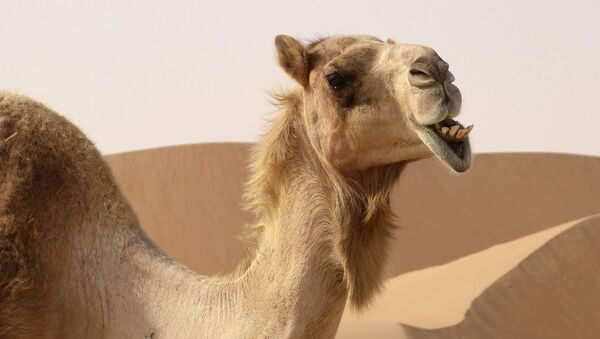Ever since lockdown restictions were introduced in India in March, Bachchan Khan has been struggling to make ends meet. As a result, his only source of livelihood Veeru, a 30-year-old camel, is starving too.
The feeble animal can no longer help its master in such financially stressful times.
Khan, who has a family of six, resides on the banks of Yamuna river in New Delhi. He can now barely manage single meal a day for the family, let alone afford food for his camel, which costs him INR 500 ($7).
“Our income has literally come to a nil ever since the deadly pandemic hit this city. I and several others haven't been able to feed our camels their healthy diet, a mixture of barn, hay and gram powder, since the lockdown,” says Khan.
About 100 such families live in huts on the banks of the Yamuna river near the ITO Flyover Bridge. Some have camels, others have elephants or goats as a source of income.
“We own camels. Some even have more than one. We used to take them to several different places across the city including India Gate and Red Fort and would earn INR 100-150 ($1.5-2) per camel ride. The daily earnings would be about INR 2,000 to 2,500 ($27-$30) a day,” says Bijay Kumar, another camel owner.
Kumar says he used to take their animals to upscale colonies, where it was possible to earn an additional INR 50-100 (about $1.3) per ride at times.
“But since March, when national lockdown was declared, tourism has been badly hit which means direct effect on our daily income. Since then the camels have started losing weight rapidly. We are unable to feed them a proper diet," says Khan, a neighbour of Kumar.
Several other families share similar tales of witnessing a difficult financial time due to Covid-19 pandemic. They say the financial crunch is posing a challenge to their survival as well as that of their hungry animals.
Sputnik spoke to several people who operate wedding bands or own horses or mares that are rented on such occasions as per Indian traditions. They too are facing a tough time. Since there are very few weddings taking place, they say they are compelled to sell these animals off at give-away prices for survival.
As per Indian traditions, when a wedding is related to some particular religious faiths like Hinduism, Sikhism and others, a groom arrives at a bride’s place riding a mare.
Usually, different people keep horses or mares whole year to use them for horse-carts or rent them to people during wedding seasons. But some wedding band businessmen also purchase such animals for a better income.
“I had invested around INR 500,000 ($6,810) by buying a mare for the business in January, just ahead of the start of the wedding season. It’s been almost six months, there is not even one customer to rent them for the wedding day. I am feeling to sell off the shop’ articles to survive,” says Vikram Lohia, a wedding band business owner from Gurugram city.
“Initially, I thought due to people not visiting any far away tourist place of the city, I would ensure such people can enjoy horse rides in residential colonies. But people have restricted our entry. They think we are unhygienic. Because we don't wear gloves or carry sanitisers, colonies’ gates have been shut for us since the lockdown,” Lohia said.
Several hundreds of such people who are dependent of earning from these domesticated animals have blamed the government.
Animal activist Gauri Maulekhi told Sputnik, she along with several others have been doing whatever is possible for animals and the families directly dependent on them.
“However, the number of people and animals being affected is way beyond imagination. Like the government has special packages for the poor people, it should also look at these speechless animals,” Maulekhi said.


